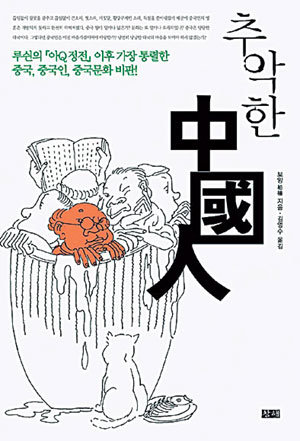[Humanities] Controversial Author Exposes the Weaknesses of the Chinese
[Humanities] Controversial Author Exposes the Weaknesses of the Chinese
Posted August. 23, 2005 03:28,

From the book Ugly Chinese written by Bai Yang and translated by Kim Young-soo; 356 pages; 15,000 won; Chang-hae.
Patient: Do you have the examination results?
Doctor: Hmm you seem to have tuberculosis. You have a bad cough, and .
Patient: Thats strange. You just coughed as well; then do you have tuberculosis as well?
Doctor: That is a different matter.
Patient: What is different? Do you mean to say that you are of different lineage from us?
Doctor: You should not speak like that. You also have a night fever .
Patient: No, you should not speak like that! Even the fan gets hot if we keep it running late into the night; does that make it a tuberculosis patient as well?
Doctor: You are also showing signs of hemoptysis.
Patient: At the dentist, patients bleed in the mouth while receiving treatment. Then they must all have tuberculosis as well!
Doctor: Of course not .
Patient: Very well then! Lets say I do have tuberculosis. But why is that a problem? Why are you doing this to me? Do you have any grudges toward me?
Doctor: There seems to be a misunderstanding.
Patient: What do you mean, misunderstanding! I knew about you the moment I saw you. You lost your mother at a young age and grew up without knowing the warmth of home, right? And in your middle ages you served a sentence in prison for rape. That is why you cannot bear to see other people enjoying their happy lives, right? You should be ashamed of yourself!
This book digs deeps into one of Chinas perceived weaknesses. The vestiges of Confucianism, deeply rooted in the lives of every single Chinese according to the author, are condemned as contagious viruses, and the dirty secrets of the Chinese are exposed.
According to the author, the Chinese refuse to recognize their own faults or weaknesses. Even when one is speaking the truth, they accept those words as an attack on them. They overreact even when an opponent gives them the slightest sidelong glance. They also go as far as to think, Is he trying to overturn the government?
The author sees this ugly dispositions roots in Chinas Confucian culture. The chains of the Buddhist priests teachings, which say that no word or writing should go against the teachings of a teacher or monk, are drying up the thoughts and imagination of all Chinese.
For more than 2,000 years since Confucius time, the book claims China has not given birth to even one philosopher. According to the author, this deep pond, this dead water, is the jar containing Chinese culture. The stench coming from this jar has made all Chinese mean and narrow-minded, according to the book.
The author claims that if it were not for the Opium War, China would still be carrying the tradition of pigtails and foot binding. If only the Opium War had taken place 300 years earlier, says the author.
This book, which is a compilation of lecture notes from a lecture given in an American university in 1984, became a hot issue among Chinese around the world as soon as it was published the following year
Never before have the values of the Chinese been subjected to such extreme censure and challenge. Many Chinese, including not only the countrys leaders, but also the most radical of students, were disgusted by the authors sweeping cultural theories.
Since the Nationalist Party retreated to Taiwan in 1949, the author has been going back and forth between Taiwan and China, constantly writing columns and commentaries that dig into the vices of Chinese society. He was imprisoned once in 1968 for provoking the sentiments of the people and the government.
His broad depictions of the Chinese caused a stir in every corner of China. If there was Lu Xun during the 54 Movement, then there was Bai Yang during the 80s in China.
Lee Key-woo, Culture Reporter, keywoo@donga.com







